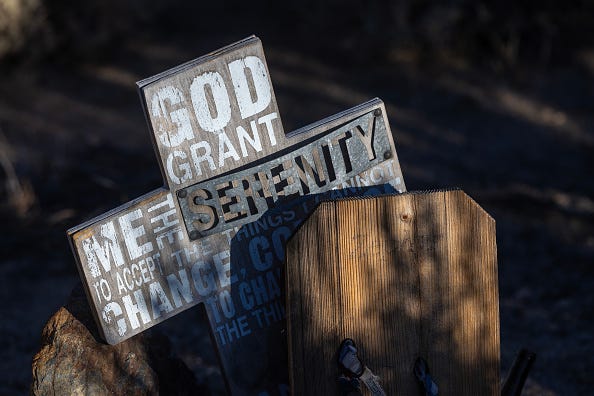A Prayer for Serenity
It’s one of the most popular prayers in the world today.
God, grant me the serenity to accept the things I cannot change, the courage to change the things I can, and the wisdom to know the difference.
The Serenity Prayer comes from Christian theologians, including Reinhold Niebuhr, who wrote a version of it in the 1930s. Here I am, a Sikh American nearly 100 years later, leaning on this teaching. It echoes with Sikh philosophy, which presents a similar kind of outlook on how to find serenity in our world. To paraphrase Guru Nanak in the opening of Japji Sahib, we become truth and overcome falsehood by learning to live in the way of the world.
I’m holding tight to these teachings, especially right now, where it feels like the world is coming apart at the seams and there’s too much for us to fix. It’s taught me an important lesson over the years: That one answer to our feeling of overwhelm is to recognize, with humility in our hearts, that there’s only so much that we can do, even when we try our hardest.
I find this way of thinking so much more compelling than others I’ve encountered and studied. For instance, some religious thinkers and believers have espoused ideas of predestination, saying that our fates are already written for us, and that we don’t have control over our own lives. Some others have argued for free will, saying we make our own destinies, and that we have the power to choose. Even when I first learned about these outlooks in high school, neither of them felt satisfying.
There’s something different, though, about the Serenity Prayer and about Sikh philosophy. They offer us a middle ground, one that feels intuitive and mirrors our lived experiences, too. We have control over some aspects of our lives, and no control over others. We can change some things, but not others. The trick to achieving serenity is what luminaries like Guru Nanak and Reinhold Niebuhr have offered us: Learning to discern between the two, learning to live in the way of the world.
This approach is not just about finding solace in accepting the things we can’t change. It’s not defeatist or fatalistic or nihilistic. Why? Because it also accounts for our own human agency. It acknowledges the responsibility we each have to shape our world for the better, to reduce our own suffering and the suffering of others.
And at the same time, it saves us from putting all the world’s weight on our shoulders. We no longer have to pretend like we must fix everything, because we move beyond the delusion that we can fix everything. There’s liberation in this realization. In a world where we’re constantly told that we can’t rest and we can’t be happy until all our problems are fixed, isn’t the wisdom of the Serenity Prayer a sigh of relief?
It can be easy to get sucked into the swell of overwhelm. I feel that. In moments like now, they feel like ocean waves, pounding against the earth, eroding the shore hit by hit, with a strong, dangerous undertow that can pull in any of us, at any time.
When I feel its pull, I find myself holding on to the Serenity Prayer as an anchor. Here’s hoping it might serve you as it has served me.
God, grant me the serenity to accept the things I cannot change, the courage to change the things I can, and the wisdom to know the difference.



Wise words, indeed... and necessary
here is a poem that I often turn to
Try to Praise the Mutilated World
Play Audio
BY ADAM ZAGAJEWSKI
TRANSLATED BY CLARE CAVANAGH
Try to praise the mutilated world.
Remember June's long days,
and wild strawberries, drops of rosé wine.
The nettles that methodically overgrow
the abandoned homesteads of exiles.
You must praise the mutilated world.
You watched the stylish yachts and ships;
one of them had a long trip ahead of it,
while salty oblivion awaited others.
You've seen the refugees going nowhere,
you've heard the executioners sing joyfully.
You should praise the mutilated world.
Remember the moments when we were together
in a white room and the curtain fluttered.
Return in thought to the concert where music flared.
You gathered acorns in the park in autumn
and leaves eddied over the earth's scars.
Praise the mutilated world
and the gray feather a thrush lost,
and the gentle light that strays and vanishes
and returns.
really appreciated reading this today, and have been thinking a lot about what it means to surrender to that loss of control right now and honor our sacred spaces and spiritual practices well. thank you friend